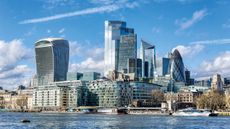Property market flatlines as average mortgage rate rises to 6%
Two-year mortgage rates have risen to above 6% for the first time since September.


The average two-year fixed mortgage deal now sits at over 6% for the first time since the end of last year ahead of expectations the Bank of England (BoE) will hike its base rate when it meets later this week.
The rate of CPI inflation fell to 8.7% in April, falling below 10% for the first time in months, but it remains significantly higher than the BoE’s 2% target. Markets and analysts are expecting rates to rise from the current 4.5% when the Monetary Policy Committee (MPC) next meets on 22 June.
Separately data from Rightmove’s house price index showed asking prices fell flat over the past month due to a “disorderly mortgage market”.
Subscribe to MoneyWeek
Subscribe to MoneyWeek today and get your first six magazine issues absolutely FREE

Sign up to Money Morning
Don't miss the latest investment and personal finances news, market analysis, plus money-saving tips with our free twice-daily newsletter
Don't miss the latest investment and personal finances news, market analysis, plus money-saving tips with our free twice-daily newsletter
What’s happening to mortgage rates?
Higher interest rates are designed to bring down inflation, but they have serious repercussions for homeowners. Indeed, house prices have been falling in 2023 as buyers retreat from the market due to higher repayment rates. Early last year, rates sat around 2%.
“Someone moving a 25-year £200,000 mortgage from 2% to 5.9% could find their monthly payment rising by more than a third, to £1,276,” says Sarah Coles, head of personal finance at Hargreaves Lansdown.
“It would add over £400 a month to their bill – which our research shows could force 88% of people into financial difficulties. Recent Bank of England figures show the scale of mortgage arrears jumped almost 10% between the end of 2022 and 2033 to £14.9 billion, and this figure is only likely to grow.”
The average rate on a two-year fixed deal is 6.01%, while the typical five-year fixed rate is 5.67%.
They peaked at 6.65% last year following the mini-Budget and have since fallen to around 5% – but the latest hike indicates lenders’ expectations rates will remain high and continue increasing.
A base rate hike would particularly affect those on standard variable rate mortgages.
What’s happening with house prices?
Average new seller asking prices fell by £82 in June – the first monthly drop in new asking prices in 2023.
June tends to be a hot month for the property sector, but this year prices fell for the first time since 2017. “We expect asking prices to edge down during the second half of the year which is the normal seasonal pattern, and while we sometimes re-forecast our expectations for annual price changes at this time, current trends suggest that our original forecast of a 2% annual drop in asking prices at the end of 2023 is still valid,” said Rightmove.
But Rightmove also said it had seen no effect on demand, just a “modest impact on sales”. But the “significant changes in the mortgage market over the last four weeks are creating renewed disruption and uncertainty among movers trying to calculate how much they can afford to borrow and repay,” said Tim Bannister, Rightmove’s Director of Property Science.
Further changes are expected as the BoE hikes rates, and those taking out a mortgage right now are likely to “feel very frenetic”.
“Although the impact of higher mortgage rates on activity levels has been limited so far, with prospective buyers who can still afford to move appearing determined to go ahead, it remains to be seen how movers will respond to the expected further rate rises,” said Bannister.
Nic studied for a BA in journalism at Cardiff University, and has an MA in magazine journalism from City University. She joined MoneyWeek in 2019.
-
-
 Investment trust discounts hit 2008 levels. Here’s how to profit
Investment trust discounts hit 2008 levels. Here’s how to profitInvestment trust discounts have risen to levels not seen since 2008, here are three trusts looking to buy to profit.
By Rupert Hargreaves Published
-
 A luxury stock to buy at a high street price
A luxury stock to buy at a high street priceInvestors wrongly consider Watches of Switzerland a high-street outlet.
By Dr Matthew Partridge Published
-
 Investing in wine: how Cru Wine is reaching new audiences
Investing in wine: how Cru Wine is reaching new audiencesTips Gregory Swartberg, founder of fine wine specialist Cru Wine, talks to Chris Carter about how to start a wine collection
By Chris Carter Published
-
 Small companies with big potential
Small companies with big potentialMichael Taylor of Shifting Shares reviews his 2023 picks and highlights more promising minnows.
By Michael Taylor Published
-
 The MoneyWeek portfolio of investment trusts – July 2023 update
The MoneyWeek portfolio of investment trusts – July 2023 updateTips A decade ago we set up the MoneyWeek portfolio of investment trusts. They remain a compelling long-term bet says Rupert Hargreaves
By Rupert Hargreaves Published
-
 Women lead the way with ethical investments
Women lead the way with ethical investmentsDemand for more ethical investments has soared – and women are more likely to opt for them. Annabelle Williams, personal finance specialist at Nutmeg, takes a look at why.
By Annabelle Williams Published
-
 BoE: Mortgage payments to rise by £220 a month for households
BoE: Mortgage payments to rise by £220 a month for householdsMillions of households can expect a mortgage spike of around £200 a month - and some may even reach a extra £1,000 a month, the Bank of England warns
By Marc Shoffman Published
-
 What happened to Thames Water?
What happened to Thames Water?Thames Water, the UK’s biggest water company could go under due to mismanagement and debt. We look into how the company got itself into this position, and what investors should expect.
By Simon Wilson Last updated
-
 Where to invest in the metals that will engineer the energy transition
Where to invest in the metals that will engineer the energy transitionA professional investor tells us where he’d put his money. This week: John Ciampaglia, manager of the Sprott Energy Transition Materials UCITS ETF.
By Nicole García Mérida Published
-
 How investors can profit from high food prices
How investors can profit from high food pricesThe latest furore over grocery prices will die down, says David Stevenson. But the long-term outlook for soft commodities remains bullish. These are the stocks investors can buy to profit from high food prices.
By David J Stevenson Published









